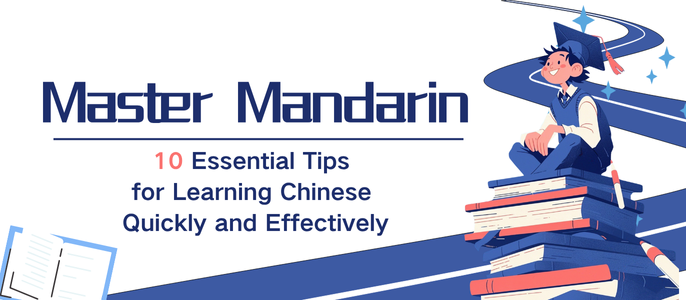Hot Articles
Master Mandarin: 10 Essential Tips for Learning Chinese Quickly and Effectively
Are you ready to embark on an exciting journey to master Mandarin?

Learning Chinese can seem daunting, but with the right strategies, you can accelerate your progress and unlock a world of opportunities.Mandarin, one of the most spoken languages globally, offers not only a fascinating glimpse into rich culture and history but also immense personal and professional benefits. Whether you’re preparing for travel, enhancing your career, or simply indulging a passion for language, knowing how to learn Chinese quickly and effectively is essential. In this article, we’ll share ten essential tips designed to simplify your learning experience and keep you motivated. From leveraging technology to understanding tonal nuances, you'll discover practical approaches that turn challenges into triumphs. So grab your notebook and let’s dive into the vibrant world of Mandarin, transforming your language-learning journey into an enriching adventure!
1. Understanding the Importance of Learning Mandarin
Embarking on the journey to learn Mandarin is not only about acquiring a new language; it’s about immersing yourself in a rich tapestry of culture, history, and opportunities. Mandarin Chinese, spoken by over a billion people worldwide, is the most spoken language on the planet. This fact alone underscores the importance of learning Mandarin, as it opens doors to communication with a significant portion of the global population. Whether you are traveling, conducting business, or engaging in cultural exchange, knowing Mandarin can significantly enhance your interactions and experiences.
Beyond the sheer number of speakers, Mandarin holds a prestigious position in the business world. China’s rapid economic growth has established it as a major global player. Proficiency in Mandarin can give you a competitive edge in the job market, especially in industries like international business, diplomacy, and tourism. Companies value employees who can bridge language gaps and foster better relationships with Chinese partners and clients. Thus, learning Mandarin can significantly boost your career prospects.
Furthermore, learning Mandarin offers a profound personal enrichment. It allows you to appreciate Chinese literature, art, and philosophy in their original forms. The language itself is a gateway to understanding Chinese thought processes and cultural nuances. By mastering Mandarin, you gain insights into the values, traditions, and worldview that have shaped one of the oldest civilizations on earth. This cultural appreciation can lead to a more holistic understanding of global diversity and interconnectedness.
2. Setting Realistic Goals for Your Mandarin Journey
One of the most crucial steps in learning Mandarin is setting realistic and achievable goals. It's easy to feel overwhelmed by the complexity of the language, but breaking down your journey into manageable milestones can make the process more approachable and less intimidating. Start by identifying your primary motivation for learning Mandarin. Are you preparing for a trip to China, aiming to enhance your professional skills, or simply pursuing a passion for languages? Understanding your motivation will help you set focused and relevant goals.
Once you have a clear motivation, it's essential to establish specific, measurable, achievable, relevant, and time-bound (SMART) goals. For instance, instead of vaguely aiming to "learn Mandarin," set a goal to "learn 50 new vocabulary words each week" or "practice speaking with a language partner for 30 minutes daily." These specific targets provide a clear roadmap and make it easier to track your progress. Remember to celebrate small victories along the way, as they will keep you motivated and reinforce your commitment.
Moreover, be patient with yourself and recognize that learning a new language is a marathon, not a sprint. It's important to avoid setting overly ambitious goals that may lead to frustration and burnout. Instead, focus on consistent, incremental progress. Allocate regular, dedicated time for language practice in your daily or weekly schedule. This steady approach not only helps in retaining new information but also builds a sustainable learning habit. By setting realistic goals, you create a positive and productive learning environment that paves the way for long-term success.
3. The Best Resources for Learning Mandarin
When it comes to learning Mandarin, having access to high-quality resources is essential. Fortunately, there is a wealth of materials available for learners of all levels. One of the most popular and effective resources is textbooks specifically designed for Mandarin learners. Books like "Integrated Chinese" and "New Practical Chinese Reader" offer structured lessons, comprehensive vocabulary lists, and exercises that cater to beginners and advanced learners alike. These textbooks provide a solid foundation and are often accompanied by audio materials to aid in pronunciation and listening skills.
In addition to traditional textbooks, online courses and platforms have revolutionized language learning. Websites like Coursera, edX, and Udemy offer Mandarin courses taught by experienced instructors. These courses often include interactive exercises, video lectures, and forums where you can connect with other learners. Apps like Duolingo, HelloChinese, ChineseSkill,and S-Mandarin provide gamified language learning experiences, making it fun and engaging to practice Mandarin on the go. These digital resources are particularly beneficial for learners who prefer a flexible and self-paced study approach.
Moreover, don't overlook the power of multimedia resources. High-quality Chinese films, TV dramas, and pop music are perfect materials for immersive language learning. S-Mandarin carefully selects the most popular shows, movies, and songs, transforming them into lively and engaging language courses. These free resources not only help you sharpen your listening skills in real-life contexts but also allow you to deeply experience the pulse of contemporary Chinese culture—making the learning process both effective and enjoyable! Podcasts and audiobooks are also valuable resources, offering a convenient way to improve your listening skills during commutes or workouts. By leveraging a diverse array of resources, you can create a well-rounded and dynamic Mandarin learning experience.
4. Immersive Techniques: Surrounding Yourself with the Language
Immersing yourself in the Mandarin language is one of the most effective ways to accelerate your learning. Immersion goes beyond traditional study methods; it involves surrounding yourself with the language in your daily life. One powerful technique is to change the language settings on your devices to Mandarin. This simple adjustment forces you to navigate your phone, computer, and apps in Chinese, providing constant exposure to the language. It may be challenging initially, but it’s an excellent way to build familiarity with common phrases and vocabulary.
Another immersive technique is to incorporate Mandarin into your daily routines. Label items around your home with their Chinese names, such as 家 (jiā) for home, 门 (mén) for door, and 水 (shuǐ) for water. This constant visual reinforcement helps in memorizing vocabulary effortlessly. Additionally, try to think in Mandarin as much as possible. Narrate your actions, thoughts, and surroundings in Chinese, even if it’s at a basic level. This practice helps in internalizing the language and improves your ability to form sentences spontaneously.
Furthermore, engaging with native speakers is a crucial aspect of immersion. Participate in language exchange programs, join Mandarin-speaking communities, or attend cultural events where you can practice speaking with native speakers. These interactions provide real-life conversational practice, which is invaluable for developing fluency and confidence. Immersing yourself in Mandarin through various techniques not only enhances your language skills but also deepens your cultural understanding and appreciation.
5. Effective Study Habits for Mastering Mandarin
Developing effective study habits is key to mastering Mandarin. Consistency is crucial, so establish a regular study schedule that fits into your lifestyle. Whether you have 15 minutes or an hour each day, dedicated time for Mandarin practice is essential. Use this time wisely by focusing on different aspects of the language, such as vocabulary, grammar, listening, and speaking. Rotating your focus helps in building a well-rounded language proficiency and prevents monotony.
Active learning techniques are particularly effective in language acquisition. Instead of passively reading or listening, engage with the material actively. For instance, practice writing characters repeatedly to reinforce memory and improve handwriting. Create flashcards for vocabulary and test yourself regularly. When learning new grammar structures, try to construct your own sentences and use them in conversations. Active engagement with the language enhances retention and understanding.
Additionally, incorporating review sessions into your study routine is vital. Language learning involves a lot of information, and regular review helps in solidifying what you’ve learned. Spaced repetition systems (SRS) are an excellent tool for this purpose. S-Mandarin uses the SRS (Spaced Repetition System) algorithm to provide review sessions at optimal intervals, ensuring long-term retention. By developing effective study habits, you create a structured and efficient learning process that maximizes your progress in mastering Mandarin.
6. The Role of Listening and Speaking in Language Acquisition
Listening and speaking are fundamental components of language acquisition, and this is especially true for Mandarin. Mandarin is a tonal language, meaning that the pitch or intonation used when pronouncing words can change their meaning. Therefore, developing good listening skills is crucial for understanding and reproducing these tones accurately. Start by listening to native speakers as much as possible. Watch Chinese TV shows, listen to podcasts, and engage with audio materials that expose you to the natural rhythm and intonation of the language.
Active listening exercises can further enhance your skills. Try to transcribe spoken Mandarin, such as dialogues from movies or recordings from language learning apps. This practice sharpens your ability to distinguish words and tones, improving both your listening comprehension and pronunciation. Additionally, mimicry is a powerful technique. Listen to short segments of speech and repeat them aloud, focusing on matching the native speaker’s tone, rhythm, and pronunciation. This exercise helps in developing muscle memory and fluency.
Speaking practice is equally important. Find opportunities to speak Mandarin regularly, whether it’s with a language partner, tutor, or through language exchange programs. Don’t be afraid of making mistakes; they are a natural part of the learning process. The more you practice speaking, the more confident and proficient you will become. Consider recording yourself speaking and listening to the playback to identify areas for improvement. By prioritizing listening and speaking, you build a strong foundation for effective communication in Mandarin.
7. Utilizing Technology: Apps and Online Tools for Learning Mandarin
In the digital age, technology has revolutionized the way we learn languages, and Mandarin is no exception. There are numerous apps and online tools designed to make learning Mandarin more accessible and engaging. One of the most popular language learning apps is Duolingo, which offers bite-sized lessons and gamifies the learning process. HelloChinese is another excellent app specifically tailored for Mandarin learners, providing interactive lessons, pronunciation practice, and writing exercises.
S‑Mandarin is a Chinese learning app focused on practical scenarios, designed to help users around the world improve their spoken communication skills efficiently through dialogue practice, standard pronunciation, and AI-powered correction. The content covers hundreds of real-life contexts such as daily life, workplace communication, and travel. It is available across multiple platforms and suitable for Chinese learners at all levels.
Online platforms like Coursera, edX, and Udemy offer structured Mandarin courses taught by experienced instructors. These courses often include video lectures, quizzes, and assignments that provide a comprehensive learning experience. Moreover, YouTube channels such as ChinesePod and Yoyo Chinese offer free lessons on various aspects of the language, from beginner to advanced levels. By leveraging these technological resources, you can create a diverse and dynamic learning environment that caters to your individual needs and preferences.
8. Overcoming Common Challenges in Learning Mandarin
Learning Mandarin comes with its unique set of challenges, but with the right strategies, you can overcome them effectively. One common challenge is mastering the tones. Mandarin has four main tones, and using the wrong tone can change the meaning of a word entirely. To tackle this, focus on listening and mimicking native speakers. Use tone drills and audio resources to practice and reinforce your understanding of each tone. Recording yourself and comparing it with native pronunciation can also help in identifying and correcting tonal errors.
Another challenge is learning and remembering Chinese characters. Unlike alphabetic languages, Mandarin uses logographic characters, which can be daunting for beginners. Break down characters into their components, known as radicals, and learn their meanings and stroke orders. This method makes it easier to recognize and remember characters. Flashcards and writing practice are effective tools for memorization. Apps like Skritter and Pleco offer interactive exercises that reinforce character learning through repetition and active engagement.
Grammar differences can also pose a challenge. Mandarin grammar is quite different from English and other Western languages, with its own rules for word order, particles, and sentence structures. To navigate this, immerse yourself in authentic Chinese content, such as books, articles, and conversations. Pay attention to how sentences are constructed and try to replicate them in your practice. Engaging with a tutor or language partner can provide personalized feedback and clarification on grammatical nuances. By addressing these common challenges with targeted strategies, you can make steady progress in your Mandarin learning journey.
9. Connecting with Native Speakers: Language Exchange and Tutoring
Connecting with native speakers is a crucial aspect of learning Mandarin. It provides authentic conversational practice and exposes you to the natural use of the language. One effective way to connect with native speakers is through language exchange programs. Websites like Tandem and HelloTalk allow you to find language partners from around the world. You can practice Mandarin with native speakers while helping them learn your native language. This reciprocal arrangement fosters mutual learning and cultural exchange.
Tutoring is another excellent option for personalized and structured learning. A native-speaking tutor can provide tailored lessons that cater to your specific needs and goals. Platforms like italki and Preply offer access to a wide range of Mandarin tutors who can work with you on various aspects of the language, from pronunciation and grammar to conversation practice. Regular sessions with a tutor ensure consistent progress and provide immediate feedback, which is invaluable for language acquisition.
Additionally, participating in local Mandarin-speaking communities and cultural events can enhance your learning experience. Many cities have Chinese cultural centers, language clubs, and events where you can practice speaking and immerse yourself in Chinese culture. Engaging in such activities not only improves your language skills but also deepens your cultural understanding and appreciation. By connecting with native speakers through various means, you create a supportive and dynamic learning environment that accelerates your Mandarin proficiency.
10. Celebrating Your Progress: Tips for Staying Motivated
Staying motivated throughout your Mandarin learning journey is essential for long-term success. One effective way to maintain motivation is by celebrating your progress, no matter how small. Acknowledge and reward yourself for reaching milestones, such as mastering a set of vocabulary words, completing a lesson, or having your first conversation in Mandarin. These celebrations reinforce your achievements and provide a sense of accomplishment that keeps you motivated.
Another tip for staying motivated is to set meaningful and enjoyable goals. Incorporate your interests and hobbies into your language practice. For instance, if you enjoy cooking, try following Chinese recipes in Mandarin. If you love music, learn the lyrics to your favorite Chinese songs. These activities make learning fun and relevant to your personal interests, keeping you engaged and enthusiastic. Additionally, setting short-term goals that align with your long-term objectives provides clear direction and purpose.
Finally, connect with a community of fellow Mandarin learners. Join online forums, social media groups, or local language meetups where you can share experiences, resources, and support. Being part of a community fosters a sense of belonging and accountability. You can exchange tips, celebrate each other’s successes, and provide encouragement during challenging times. By staying motivated and celebrating your progress, you create a positive and sustainable learning journey that leads to mastering Mandarin.












